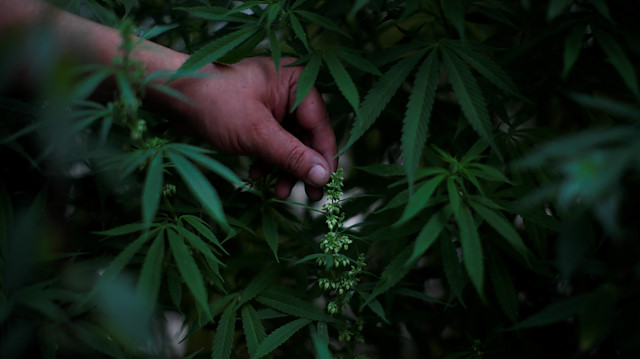
Cannabis becomes backbone of rural economy for unemployed youth
Phosho Mamba, 17, endures the spring's baking sun as he works on his small dagga, or marijuana, field. He toils hard to put food on the table.
His parents are deceased and he was saddled with family responsibilities at a tender age.
The form-two pupil goes to a high school in Luve, a village town in the Manzini region. He last attended school in March when King Mswati III, Africa's last absolute monarch, declared a state of emergency that abruptly closed schools in the southern African nation.
"With schools closed, I had to do something to make money rather than sit idle at home. I decided to try my luck in growing cannabis. I didn't know where to start, but sought my friends help," said Mamba.
In a few weeks he will be harvesting. He and his friends barely sleep at their homes. They spend nights manning the field to fight off those who might steal their hard labor. "I am about to harvest soon. I don't want to commit a mistake in referees time, I just make sure that everything is in order," he said. "With South Africa relaxing lockdown next week, I am positive prices will be good."
Walter Magagula (17) is another pupil who has pulled a feat, cashing in during the lockdown. He is doing Form 5 at another high school at Luve and will be writing his final exams in October.
Like Mamba, he invested time in growing the cannabis plant, popularly known as "Swazi gold." He recently bought a Nisan March, after a good harvest and the car is the first in his family’s history.
"My father doesn't have a problem with the car. He knows that I respect him and it's my contribution to the well-being of the family," said Magagula. "This is not my car but a family car. We would not hire or bother other people in cases of emergency."
Mamba and Magagula are among hundreds of Swazi rural school children who delved into illegal dagga farming immediately when schools were closed under a strict coronavirus lockdown.
- Legalization of marijuana
Notably, Eswatini, formerly Swaziland, is one of the few southern African countries where cannabis is illegal.
But, in the present tenure of Prime Minister Ambrose Dlamini things might change.
Dlamini launched the Strategic Road Map 2018 to 2023 where he said the government would legalize dagga farming to revive the economy. The executive is currently consulting stakeholders on the Opium and Habit-Forming Drugs Bill.
Stem Holding, a giant American company specializing in cannabis and hemp-branded products, is one of the investors that have shown a keen interest in Swazi dagga. The cannabis market for Swazi illegal growers is South Africa and Europe.
However, the twist in the tale is that indigenous dagga growers are opposed to its legalization. "It will not be a good thing to have the herb legalized. The move will bring down black market prices," said Mamba.
His sentiments were shared by Magagula who also was also reluctant. "I am not sure if we'll continue to make money. I think it should remain illegal just as it is," he said.
Afrobarometer, a non-partisan research network in Africa, highlights contesting views amongst the Swazi population on legalization.
It interviewed 1,200 adults in Swaziland and results suggest 57% “disagree” or “strongly disagree” with the idea of broadly legalizing the cultivation of cannabis to create economic opportunity.
-Learners struggle to learn
On the hand, can the dagga-cum-students juggle school work and business without dropping either ball?
Celiwe Dlamini, a teacher at Lomahasha Central High School in the Lubombo region, said the behavior of students has left teachers frustrated.
Her school is located next to the Lomahasha border between Eswatini and Mozambique.
"The children have tasted money. Now it’s difficult to teach. They hardly concentrate. They don't do school work and we can't use corporal punishment, it's really frustrating," she said.
"It's like COVID-19 flooded their minds with a barrage of business ideas. They started to plant dagga and smuggled it into Mozambique and in turn, smuggled Mozambican alcohol into Swaziland. It's not easy to shape back their mindset to focus on school work again," said Dlamini.
Nonkululeko Mdluli, the director of Fundza, an NGO that promotes the culture of reading books in schools, said COVID-19 has dented education in the country.
"I can't lie. Our education sector has been hugely impacted by the coronavirus pandemic, it will take months to get our children back on track. COVID-19 came with a lot of innovations, some of which are detrimental to education" said Mdluli.
- Modern parenting challenges exposed
Mbongwa Dlamini, head of the Swaziland National Teachers Association, said COVID-19 has exposed the fact that parents have abdicated their responsibilities to teachers because children spend most of the time at school.
"COVID-19 has exposed the state of parenting in Swaziland and the challenges facing Orphaned and Vulnerable Children (OVC) in our society. Now that children are not at school, parents fail to handle their own children. Statistics have shown an increase in the number of pregnancies amongst school youth during this COVID-19 break," said Dlamini.
The UN Development Program (UNDP) reported that since schools closed because of the pandemic, the disruption affected 909 primary and secondary schools, 339,000 students and 15,945 teachers in Swaziland and closures have higher social and economic costs for communities, particularly to vulnerable boys, girls and their families.


